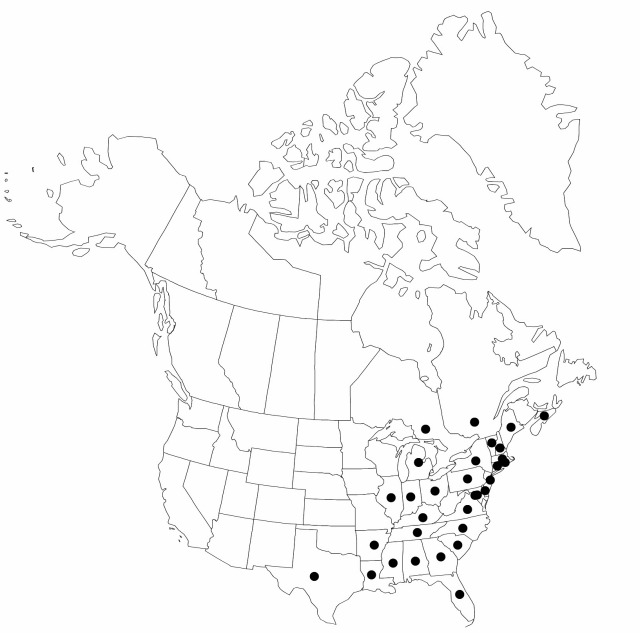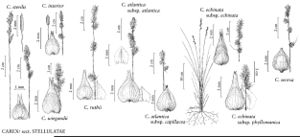familyCyperaceae
genusCarex
sectionCarex sect. Stellulatae
speciesCarex atlantica
subspeciesCarex atlantica subsp. capillacea
Difference between revisions of "Carex atlantica subsp. capillacea"
Contr. Univ. Michigan Herb. 14: 191. 1980.
Common names: Carex atlantique
Basionym: Carex interior var. capillacea L. H. Bailey Bull. Torrey Bot. Club 20: 426. 1893
Synonyms: Carex howei Mackenzie Carex mohriana Mackenzie
FNA>Volume Importer |
FNA>Volume Importer |
||
| Line 8: | Line 8: | ||
}} | }} | ||
|common_names=Carex atlantique | |common_names=Carex atlantique | ||
| − | |basionyms={{Treatment/ID/ | + | |basionyms={{Treatment/ID/Basionym |
|name=Carex interior var. capillacea | |name=Carex interior var. capillacea | ||
|authority=L. H. Bailey | |authority=L. H. Bailey | ||
| + | |publication_title=Bull. Torrey Bot. Club | ||
| + | |publication_place=20: 426. 1893 | ||
}} | }} | ||
|synonyms={{Treatment/ID/Synonym | |synonyms={{Treatment/ID/Synonym | ||
| Line 57: | Line 59: | ||
|publication year=1980 | |publication year=1980 | ||
|special status= | |special status= | ||
| − | |source xml=https://jpend@bitbucket.org/aafc-mbb/fna-data-curation.git/src/ | + | |source xml=https://jpend@bitbucket.org/aafc-mbb/fna-data-curation.git/src/f6b125a955440c0872999024f038d74684f65921/coarse_grained_fna_xml/V23/V23_587.xml |
|genus=Carex | |genus=Carex | ||
|section=Carex sect. Stellulatae | |section=Carex sect. Stellulatae | ||
Revision as of 19:09, 24 September 2019
Culms usually 10–60 cm. Leaves 0.4–1.55 mm wide, widest (0.65–)0.8–1.6 mm wide. Inflorescences usually 0.8–2 cm; spikes 2–5. Perigynia 1.9–3 × 1.3–2 mm, (1.15–)1.3–1.7(–1.9) times as long as wide; beak 0.45–0.95 mm.
Phenology: Fruiting late spring–early summer.
Habitat: Bogs, acidic coniferous swamps, wet, acidic soils
Elevation: 0–300 m
Distribution

N.S., Ont., Que., Ala., Ark., Conn., Del., D.C., Fla., Ga., Ill., Ind., Ky., La., Maine, Md., Mass., Mich., Miss., N.H., N.J., N.Y., N.C., Ohio, Pa., R.I., S.C., Tenn., Tex., Vt., Va.
Discussion
The two Carex atlantica subspecies are quite distinct over most of their ranges, but in the south, especially in the Gulf States, intermediates and specimens showing some characteristics of one subspecies and some of the other are occasional.
Selected References
None.
Lower Taxa
None.
